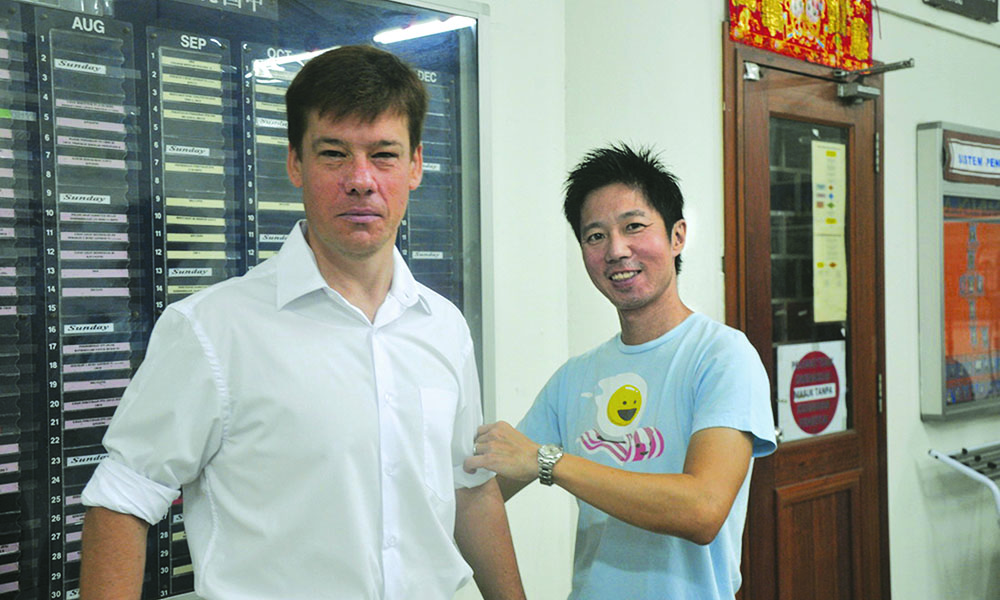By Shu Ping
“A good father is one of the most unsung, unpraised, unnoticed, and yet one of the most valuable assets in society,” said Billy Graham. History is full of stories about great figures and heroes, but a good number of them owed their success to their fathers — the unsung heroes who led by example and taught them life skills and moral values.
To commemorate Father’s Day this June 19, we look at three great figures from ancient China, whose outstanding fathers brought them to greater heights.
The Father of the Heroic General
Many of us know the story of Yue Fei (岳飞), the heroic Chinese general of the Southern Song Dynasty who fought against the Jurchen invaders and eventually sacrificed his life for his country. However, few are aware of Yue He(岳和), the extraordinary father behind the hero.
According to conventional rhetoric, Yue Fei’s father passed away when Yue Fei was very young, and Yue Fei was raised by his mother alone. However, there are some who believe that Yue He actually passed away when Yue Fei was a lot older, at 22 years old.
As proof of this, the History of Song documents that “Yue Fei mastered brilliant archery skills under [the martial artist] Zhou Dong (周侗), and was able to shoot with either hand. After Zhou Dong’s death, Yue Fei missed him dearly and would pay his respects at his grave every 1st and 15th day of the month. Yue Fei’s father was full of praise for Yue Fei’s positive attitude of respecting his teacher and not forgetting his roots.”
From this, we know that Yue He was still around when Zhou Dong passed away, an event that took place when Yue Fei was 19 years old.
Having said that, how did Yue He educate his child when he was alive, and how did he influence Yue Fei?
According to historical records, Yue He was a kind and generous man. During times of famine, he and his family would scrimp on their meals so that they could distribute the remaining food to any starving people. Once, Yue He lent money to an acquaintance, who later lied that he could not pay him back. Despite knowing his pretence, Yue He chose to let it go. Others have also tried to take advantage of Yue He’s kind nature by stealing his family’s land. For his generous and benevolent nature, Yue He was greatly respected by the villagers.
As Yue Fei grew up, Yue He noticed how obedient and intelligent his son was. He thus specially engaged a teacher to teach Yue Fei the ancient classics and Chinese history, and made him practise calligraphy diligently. From Yue Fei’s existing calligraphy and essays to date, it is clear that Yue Fei went through a solid education.
Apart from writing, Yue Fei was also very interested in military tactics and spent a lot of time researching and reading military texts. Although the Song Dynasty people placed greater emphasis on liberal and visual arts as opposed to martial arts, Yue He remained very supportive of Yue Fei’s interest in martial arts.
Yue Fei later became Zhou Dong’s student. Under Zhou’s strict coaching, the physically fit Yue Fei could lift the weight of eight boulders, pull a 300-jin bow, and shoot arrows using either hand with dead accuracy. Yue Fei would not have excelled in both literature and martial arts, had it not been for his father’s full support and encouragement.
After Zhou Dong’s death, Yue He saw that the Song Dynasty was declining and faced frequent external threats. As such, he constantly advised his son to be loyal and willing to sacrifice for the country.
Shortly after, Yue Fei enlisted in the army and led his famously disciplined troops to many victorious battles against the Jurchen invaders. Just when he was nearing the end of his long campaign, corrupt officials had him recalled to the capital, where he was sentenced to death. Even till the last day of his life, Yue Fei’s values never wavered.
All in all, Yue He played a crucial role in Yue Fei’s historical achievements. He passed on to Yue Fei his values of generosity, kindness, and love for the country and its people. He also provided Yue Fei with an all-rounded education and his full support, nurturing him to become an expert in both literature and martial arts. Yue He paved the way for a role model, who would be revered for generations to come.

Yue Fei (岳飞) would not have excelled in both literature and martial arts, had it not been for his father’s full support and encouragement.
The Father of the Self-Sacrificing Official
Fang Xiaoru (方孝孺) was a Confucian scholar and official of the Ming Dynasty, who was known for his unwavering loyalty and sense of justice. For upholding his values, he was slapped with the infamous “extermination of ten degrees of kinship” sentence, the only documented person in Chinese history to receive this brutal punishment.

According to historical records, after the Prince of Yan usurped the throne and became the Yongle Emperor, he tried to force Fang Xiaoru to write a fake edict that would speak favourably of his usurpation. But Fang Xiaoru refused and reprimanded the Yongle Emperor.
Enraged, the Emperor threatened Fang with the “extermination of nine degrees of kinship”, where all of his relations to nine degrees would be killed. Fang Xiaoru retorted, “Never mind nine degrees; go ahead with ten!”
So the emperor had all nine degrees of his relatives, and the tenth family — his students and friends — executed. Fang himself was brutally executed by being pulled apart with horse carriages. Altogether, 873 people were said to have been killed.
Fang Xiaoru was not afraid to die to uphold justice, just like his father, Fang Keqin (方克勤). An honest and upright Ming Dynasty official, Fang Keqin served his people with utmost loyalty, putting his life and career on the line several times.
When Fang Keqin became governer of Jining Province, the country was suffering from famine and the onset of a difficult winter. The law at the time stipulated that, before winter began, all citizens were required to deliver clothes to the Northern army guards. The citizens were only allowed to travel by land and not by sea, and those who did not comply would be sentenced to death.
However, the harsh climate that year made travelling by land much more hazardous than by sea. Understanding the people’s plight, Fang Keqin risked his life and permitted the people of Jining to journey by sea instead. It was later attested that thousands of people from other provinces lost their lives travelling by land, and Jining was the only province where no one died. In consideration of the lives that Fang Keqin had saved, the imperial court pardoned his violation of the law.
One summer, the army guards of Jining shirked their responsibility to repair the city walls, and forced the people to do the repairs instead. The people were already struggling with a poor crop yield that year, and when they learned they would have to forsake their crops, they cried in desperation.
Troubled by this, Fang Keqin discreetly reported the matter to his superiors. However, his superiors were too frightened to report the names of the corrupt generals. So Fang Keqin himself filed a report listing the names of those responsible.
Upon reading Fang Keqin’s report, the prime minister immediately ordered a halt to the repair of the city walls. On the day the decree reached Jining, the province had its first rainfall after a long period of drought. Elated, the people sang songs commending Fang Keqin for his virtuous governance.
In another incident, the Marquis of Yongjia was leading a fleet of boats through Jining. However, due to drought, the river was too shallow for the boats to pass. The Marquis wanted to mobilise 5,000 commoners to clear a passageway, but Fang Keqin objected and instead chose to pray to the heavens. A huge downpour suddenly occurred, filling the river several feet deep. This incident shocked the people, who thought that Fang Keqin may have supernatural abilities.
Despite his high position, Fang Keqin led a simple and thrifty life. He wore a coarse cloth robe, and his house was crudely furnished with grass mats. He would refuse gifts or favours from anyone including friends and subordinates, but would drop everything to help them when they were in need. He gave away most of his salary to the poor and needy, such that he had little savings for himself.
It was a shame that such an honest and upright official was implicated in the “investigation of the pre-stamped documents”. During the Ming Dynasty, Emperor Hongwu executed hundreds of officials for pre-stamping fiscal documents as a convenience. Fang was framed by his enemies and executed as well.
Both Fang Keqin and Fang Xiaoru exemplify the saying, “Like father, like son.” Till the very end, they remained loyal officials who were unafraid of sacrificing for justice and the people.
The Father of the Master Calligrapher
Traditionally known as the Sage of Calligraphy, Wang Xizhi(王羲之) was a master calligrapher of the Jin Dynasty, and arguably the best calligrapher in Chinese history. He trained his youngest son, Wang Xianzhi (王献之), to become a master calligrapher as well, and his son went on to become one of the best calligraphers of his time.

Wang Xizhi started training his son in calligraphy when he was seven years old. Xianzhi showed great talent and skill from a young age, and his calligraphy was often praised by his father’s friends and relatives. Everyone said that Xianzhi would grow up to be as famous as his father.
But the constant praise worried Wang Xizhi and his wife, who did not want their son to become arrogant and complacent. The couple thus made sure that Xianzhi remained humble and hardworking.
One day, Xianzhi asked his mother, “How much longer do I need to practice calligraphy?” His mother smiled and replied, “When you have finished writing with the 18 vats of water in the yard, only then will your strokes be steady and firm.” Xianzhi didn’t quite believe her, but he saw his father standing behind him with a stern, no-nonsense expression on his face. Thereafter, Xianzhi spent another five years practising calligraphy in the yard.
One day, Xianzhi showed his father some of his calligraphy, hoping to earn some praise. But Wang Xizhi kept silent and added a dot under one of Xianzhi’s characters, 大, to create the character 太. When Xianzhi showed the calligraphy to his mother, she looked carefully at it and said, “You have practised calligraphy for so many years, and you have gone through so many vats of water. But even then, only the dot on the character 太 resembles your father’s calligraphy.”
Upon hearing this, Xianzhi felt deeply ashamed. He realised he still had to a long way to go before he could be as good as his father. Thereafter, Xianzhi humbled himself and practised very hard. He eventually became a master calligrapher himself and his skills were considered to be on par to his father’s. Both father and son are known as the famous “Two Wangs” of Chinese history.
Fang Xiaoru (方孝孺) was not afraid to die to uphold justice, just like his father, Fang Keqin (方克勤).
















